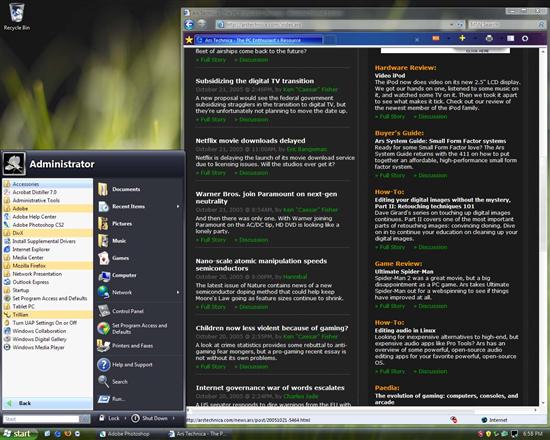Windows Vista will replace Windows XP as the operating system of choice in little over a year if Microsoft can stick to its schedule. Vista, good or bad, will have a huge impact due to Microsoft's dominance. So the question is, are they heading in the right direction? Let's try and figure that out in what is the first of two articles on Vista. Here we will focus on the interface and built in applications. Part two will focus on performance, compatibility, and the framework of the system.
DISCLAIMER: Windows Vista Build 5231 is not even considered beta software, rather it is a community Technology Preview release. This means, among other things, that a lot should change before the final release. Hopefully a lot of the issues that I'm about to bring up will be addressed and stability should be at least up to par with Windows XP by the time they send this to consumers. A word to the wise, while I have advocated playing with various pieces of beta software, this isn't one of them. Besides limited availability, this build has serious stability and compatibility issues.
Vista Basics
Windows Vista sprung from the Windows Server 2003 code base. Well, the current iteration of it has anyway. It appears that the original, much delayed Vista code base got so out of hand that Microsoft scrapped it and started again with their best operating system to date. Probably not such a bad thing in the end, but it did lead to them cutting several high profile features, most notably WinFS.

The all program feature has been changed as you can clearly see
WinFS was to be the the way we found and dealt with files. Seems Apple has beaten Microsoft to the punch once again. While not a system wide feature, Apple's latest professional application, Aperture, uses a SQL database to manage RAW image files. They've integrated it cleverly, improving performance while getting rid of the need to ever deal with files and versions.
Vista will likely ship with a whole pile of versions just like XP (Home, Pro, Tablet, Media Center). In addition it looks like they will have separate 32-bit and 64-bit versions, a real downer compared to Apple's OS X. Hopefully Microsoft will play it smart with upgrades and the retail versions and have a single disc with everything on it; otherwise it could get pretty crazy.
You want to see some pictures though right? Well get prepared for the next page where the new interface gets a once over.